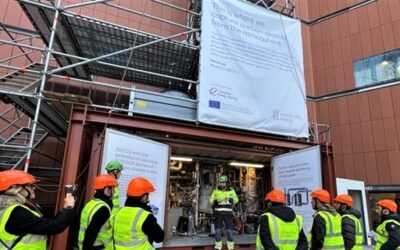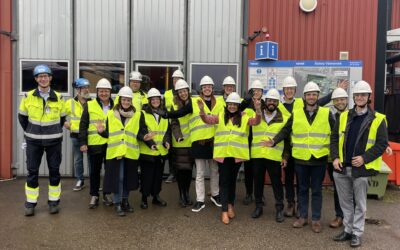Paris-Le Bourget airport soon to be heated by geothermal energy • ADEME's heat fund is to be increased to €800 million in 2024 • New contract model announced for concession contracts in the French DHC sector

Work has just begun to connect the Paris-Le Bourget airport in Seine-Saint-Denis to the future Dugny-Le Bourget district heating network, with a concession contract signed between the Paris Terres d’Envol intermunicipal association and the Coriance Group. By 2030, 90% of the heating needs of the airport and its businesses will be met by cleaner, cheaper energy from a geothermal plant in Dugny. In its entirety, the new network will provide an equivalent of heating needs of 9,000 homes.
The building of the geothermal plant along with 20 kilometers of network is estimated to require a total investment to €56 million. Groupe ADP has also subsidized the development of the network, with the assessed environmental and financial benefits motivating an investment of €2.5 million towards the network development.
In addition to the airport, the network will also distribute heat to a second major building complex: the Dugny Media Village, which will welcome journalists and technicians from all over the world during the Paris 2024 Olympic Games. Coriance has planned to connect the future Dugny-Le Bourget district heating network to the existing Blanc-Mesnil network which it also operates. This will allow for demand optimization, with the two networks reinforcing each other in the event of peaks in consumption.
Read more in news article from Les Echos
The growing interest in district heating, and the advantages of independence from the uncertain gas market, has created bottlenecks to increase production capacity in par with demand. In light of this, ADEME’s heat fund is to be increased to €800 million in 2024. According to Les Echos, this will likely increase the number of district heating projects, with an increasing number of local authorities investing in district heating networks in the near future.
Today district heating holds a 5% market share for heat in France, compared to 60% in northern European countries such as Denmark. However, Les Echos has interviewed Frank Lacroix at Engie who expressed that there is a strong desire to accelerate the development of district heating in France, with an ambition to double the contribution of district heating networks by 2030. However, professionals in the energy sector have expressed that the French state has not provided adequate resources to realize these ambitions. Notably, Les Echos outlines that many networks have reached saturation in capacity with queues forming for customers to be connected to the networks. Despite this, projects are being delayed because of insufficient investment subsidies from the government.
As a response to the greater demand, the new budget allocated for ADEME’s heat fund has increased with €300 million for 2024, bringing it to the total €800 million previously mentioned. In the wake of this positive growth trajectory for the district heating sector, Les Echos outlines the risk of a looming battle for increased access to biomass. The transport and aviation sectors, along with the energy sector, are all in a hurry to reduce their carbon emissions, and the growing demand for renewable resources will likely raise new questions on how to increase local production of biomass.
Read more in news article from Les Echos
A new contract model for concession contracts in the DHC sector has been drafted by Amorce and Fedene, addressing current issues in the sector, such as the energy transition and new ways to conduct data management.
Le Moniteur refers to the new model as adaptable, with a possibility to adapt or negotiate terms of the contract. For example, to manage risks associated with different types of soil creating challenges for construction of new networks, the contract model provides for several possibilities; either the concessionaire assumes this risk on a limited basis, with a ceiling on its liability for the consequences of soil conditions, or the public entity assumes this risk in full. There is also room for negotiation concerning the indexation of tariffs, which serve as remuneration for the concessionaire. The model specifies that the indexation methods are to be determined locally and recommends that the use of indices are independent of the parties to the contract, according to Le Moniteur.
The new model contract has also made it possible to address recent issues raised in the district heating and cooling network sector. Notably, the model raises addresses the energy transition and data management. For data management, the new contract model specifies how data is to be transmitted. This issue is a key development considering the ongoing development of smart grids, which require more data to be collected and processed.
Read more in news article from Le Moniteur
To stay updated on news for sustainable heating and cooling, follow us on LinkedIn, and subscribe to our Newsletter.
Sweden is at the forefront of decentralised heat networks technology. Our aim for “Sustainable Heating & Cooling by Sweden” is to facilitate knowledge sharing between British, French and Swedish stakeholders and develop and encourage environmental and economic best practice.
To find out how we can help you and your organisation, please contact our London or Paris-based “SHC” teams. We can introduce you to leading consultants, suppliers of technology and services who will be pleased to share know-how of the development of sustainable heating & cooling solutions.


